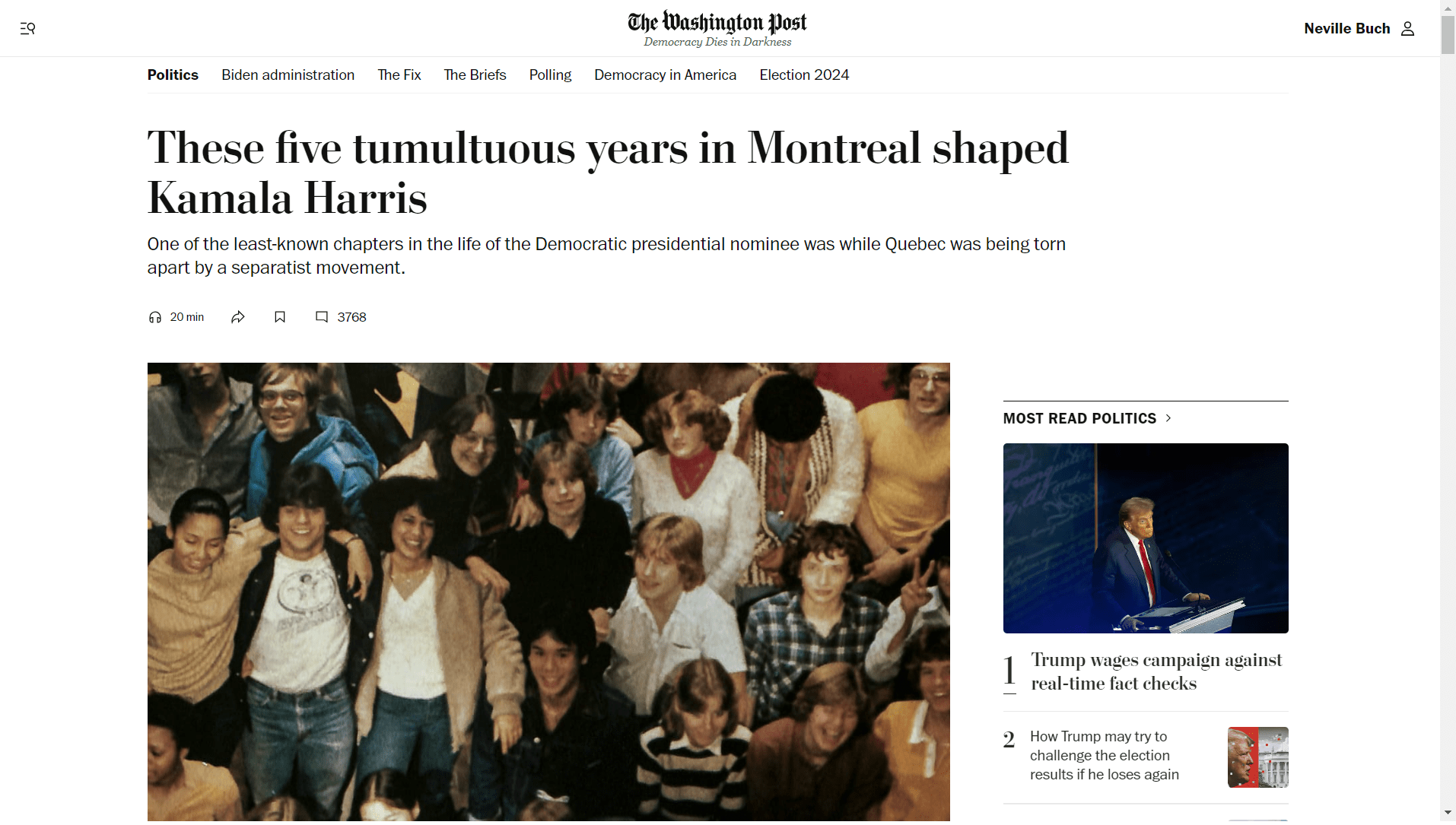Michael Kranish, “These five tumultuous years in Montreal shaped Kamala Harris”, The Washington Post, October 13, 2024 at 6:00 a.m. EDT.
MONTREAL — Kamala Harris was just starting her freshman year at a high school in Quebec when, as one of her classmates recalled, “all hell broke loose.”
After years of deepening conflict over the French-speaking majority’s treatment, a political party advocating political separation from Canada had recently taken power. Tens of thousands of English-speaking families fled as stringent new language restrictions took effect.
In the fall of 1978, everything boiled over inside Westmount High School on the outskirts of downtown Montreal. As students clashed over the political turmoil, the once primarily White and wealthy school was changing dramatically amid an influx of Black, lower-income students, including those driven to enroll when their own English-language schools suddenly were slated for closure.
Harris, a Black and Indian American expat who had left California for Canada 18 months earlier, found herself a target.
“She was bullied to a degree,” said Westmount classmate Jamie Ward, who declined to further detail what she described as racist remarks directed at Harris. “I would never repeat that. Myself being biracial, it’s harmful and it’s hurtful.”
Throughout her political career — as San Francisco district attorney, California attorney general, U.S. senator, vice president and now Democratic presidential nominee — Harris has rarely mentioned the five years she spent in Canada, between ages 12 and 17. Her memoir, “The Truths We Hold,” carries the subtitle “An American Journey,” and in it she describes her time in another country in a little more than one page. She said in her Democratic National Convention speech that she had moved “to Illinois, to Wisconsin and wherever our parents’ jobs took us,” but did not mention living in Canada. Harris declined an interview request, and her campaign declined to respond to a list of questions submitted for this article.
But her little-examined Canadian journey, as much as any period of her life, profoundly shaped her path, from becoming a prosecutor to accepting the nomination for president, according to interviews with more than two dozen classmates, teachers and others who knew her in Montreal.
Daily life in the Montreal of the late 1970s and early 1980s vividly showed Harris the real-world consequences of deep political division, while the eruptions of conflict at her high school drove home the reality of racism she would face as a biracial woman. Harris honed her early political instincts as she navigated high school bullies and a roiling political atmosphere, emerging, classmates say, as a student confident and popular across racial lines.
While many of her former classmates say they understand that Harris may feel it is politically unhelpful to talk about the time she spent in Canada, they also say there’s no doubt that those years are crucial to understanding the woman seeking the presidency.
Indeed, one of the most profound events in Harris’s early life, by her own account, came in Montreal when a high school friend confided that she was being molested. Harris insisted that Wanda Kagan move into her home, and later said the incident led her to become a prosecutor.
The same centrist dynamics is there in Australia, where there are a few political players with more than one worldview layer in their cognition, and have the capacity to centre between worldviews. The difference between the North American and Australian experience is that the capacity to deeply centre is less obvious in Australia among our current crop of political players.
Neville Buch
Latest posts by Neville Buch (see all)
- Dear grossly, ethically, corrupted - December 21, 2024
- Thoughts with a Professional History colleague on “Artificial Intelligence” - December 21, 2024
- Stephanie M. Lee on “AI by omission”, The Chronicle of Higher Education, Thursday, December 19, 2024 - December 20, 2024

